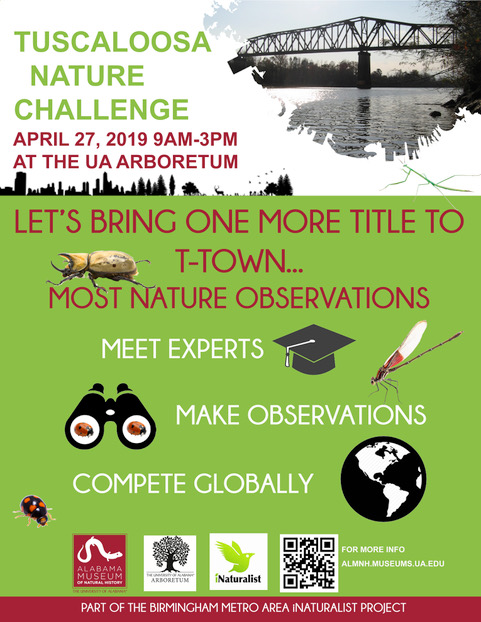
The Tuscaloosa Nature Challenge will take place at the University of Alabama Arboretum on Saturday, April 27, 2018 from 9 AM to 3 PM. This annual event is part of the iNaturalist’s City Nature Challenge (CNC) event, and all nature observations made will be included in the Birmingham Metro Area CNC Project.
Schedule of Activities
All scheduled activities and walks will start at the iNaturalist table under the Pavilion. In addition there will be several ongoing activities under the Pavillion throughout the entire event (iNaturalist station, crafts, field guide table, preserved plants, and live and preserved insects.
- 9:00 AM – Guided Bird Walk
- 10: 00 AM – Guided Butterfly Walk
- 10:00 AM – Kids’ Pond Life Exploration
- 11:00 AM – Guided Fungi and Mushroom Walk
- 11:00 AM – Leaf Litter Invertebrate Activity
- 12:00 PM – Guided Insect Walk
- 1:00 PM – Guided Wildflower Walk
- 2:00 PM – Kids’ Plant, Bugs and Pollinator Walk
- 2:00 PM – Fresh Water Pond Exploration
What is this nature challenge all about?
iNaturalist’s City Nature Challenge (CNC) is an annual global competition that encourages people to go outside and discover local wildlife. Simply observe and take a picture of plants and animals in natural areas near you, between April 26th and April 29th, 2019. No prior experience necessary – anyone and everyone is welcome to participate!
The CNC began in 2016 with just two cities (Los Angles & San Francisco), and has grown each year such that more than 150 cities around the globe will be participating in this year’s challenge. This year the 2019 Birmingham Metro Area iNaturalist Project which will be the first project from Alabama to compete in a City Nature Challenge. This CNC project will include all iNaturalist observations made between April 26 – 29, 2019 from Bibb, Blount, Calhoun, Coosa, Cullman, Etowah, Jefferson, Shelby, St. Clair, Talladega, Tuscaloosa, and Walker Counties.
The CNC competition takes place in two parts: first nature observations need to be made between April 26 – 29, and then from April 30 – May 5 there is a period for these observations to be identified by the iNaturalist community as best as possible before the challenge ends, and the final numbers are counted for each competing city project in the event.
How can I participate?
1. Visit iNaturalist.org and download the iNaturalist app (App Store and Google Play).
2. Create an account (it’s quick!), then visit the City Nature Challenge 2019: Birmingham Metro Area project and select “Join.”
3. From April 26 through April 29, explore forest preserves, parks, gardens, and even your own backyard. Participate on your own, or join a guided tour that will help you discover new places and amazing wildlife alongside cool people (see below for a list of guided tours).
4. Take pictures of wild plants, animals and other evidence of wildlife (shells, tracks, bones) using a camera or smartphone. Visit the Getting Started guide on iNaturalist to learn how to submit your observations.
5. Your observations will be identified by and receive feedback from scientists, experts and other naturalists.
FAQ
Why participate?
There is nature all around us, even in our urban areas! Knowing what species are in our region and where they are helps us study and protect them. The ONLY way to do this is to have all of us – scientists, land managers, and the community – working together to find and document the nature in our area. By participating in the City Nature Challenge, not only do you learn more about your local wilderness, but you can also make your city a better place – for you and for nature.
What plants and animals are considered ‘wild’?
For the purposes of this project, ‘wild’ refers to living (or once-living) life forms that have not been cultivated or domesticated by humans. One of the primary goals of City Nature Challenge is to find out how many naturally-occurring organisms can still be found in our urban and suburban areas. While observations of your sister, your cat and your neighbor’s tulips are quite lovely, the project organizers ask citizen scientists to look for wildlife, plants and fungi that have likely not been placed there by human hands. The observations will help scientists determine the health of our natural areas, what species are successful in highly-populated areas, the vulnerability of specific plant and animal populations, and the levels of protection needed for our wildlife to thrive.
We hear you thinking, “well, what about invasive species? They were brought here by humans.”
It is valuable to document invasive species living in our natural areas. If you are unsure if a plant or animal is considered ‘wild,’ go ahead and submit it. The experts behind the scenes will determine whether it belongs in the data set or not.
City Nature Challenge 2019: Birmingham Metro Area Partners
CNC Project Organizer:
CNC Project Collaborating Organizations :
- Birmingham Audubon
- Birmingham Botanical Gardens
- Cahaba Environmental Center at Living River
- Cahaba River Society
- Cahaba Riverkeeper
- Nature Conservancy Alabama
- University of Alabama Arboretum
CNC Related Events
- Cahaba Environmental Center 2019 BioBlitz
- Tuscaloosa Nature Challenge
- Shade Creek Fest